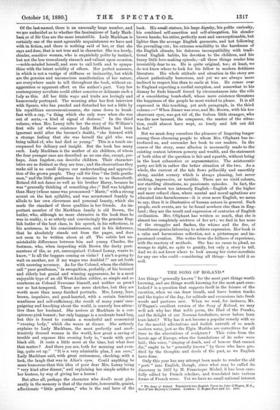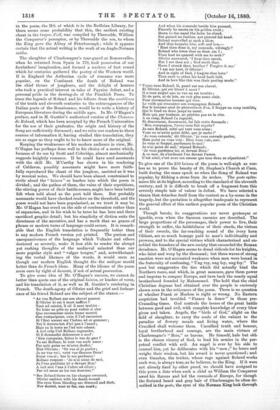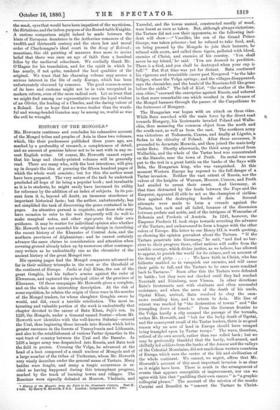THE SONG OF ROLAND.*
ARE things " generally known " for the most part things worth knowing, and are things worth knowing for the most part over- looked ? is a question that suggests itself in the leisure of the vacation, when we can draw breath, and leave beaten tracks. and the topics of the day, for solitude and excursions into fresh woods and pastures new. When we read, for instance, Mr. O'Hagan's excellent version of the Song of Boland, we may well ask why has that noble poem, the Iliad of the Franks, and the delight of our Norman forefathers, never before been translated ? Why has it not become a popular remedy with us for the morbid affectations and foolish untruth of so much modern verse, just as the Elgin Marbles are correctives for all time to the aberrations of sculpture ? This voice from the heroic age of Europe, when the foundations of its order were laid ; this voice, " singing of death, and of honour that cannot die," ought to be " generally known " by those who have pro- fited by the thoughts and deeds of the past, as we English have done.
Only this year has any attempt been made to render the old "geste" into English, though, since what may be called its discovery in 1837 by M. Francisque Michel, it has been care- fully edited by French scholars, and translated into various forma of French verse. Yet we have no small national interest • The dery of Rolasd. Translated into Engiolispl:tiVerse by Jobo ILA,* One of her Majesty's CounaeL London : 8•g►u Paul and Co. HMO.
in the poem, the MS. of which is in the Bodleian Library, for there seems some probability that this, the earliest existing chant in the langue d'oil, was compiled by Theroulde, William the Conqueror's preceptor, or by Theroulde the son, to whom the King gave the Abbey of Peterborough ; while it appears certain that the actual writing is the work of an Anglo-Norman scribe.
The slaughter of Charlemagne's rear-guard at Roncesvalles, when he returned from Spain in 778, took possession of our forefathers' imagination, and formed a nucleus of fact round which for centuries gathered the poetry of the Western world. If in England the Arthurian cycle of romance was more popular, on the Continent the death of Roland was the chief theme of jongleurs, and the delight of hearers who took a practical interest in tales of Paynim defeat, and a personal pride in the derring-do of the Frankish Peers. To trace the legends of Roland and his fellows from the cantilenes of the tenth and eleventh centuries to the extravagances of the Italian poets of the Renaissance, would be to write a history of European literature during the middle ages. In Mr. O'Hagan's preface, and in M. Gautier's authorised version of the Chanson de Roland, which has been accepted by the French Universities for the use of their graduates, the origin and history of the Song are sufficiently discussed ; and we refer our readers to these sources of information if, having studied this translation, they are as eager as they ought to be to know more of the original.
Keeping the weaknesses of his modern audience in view, Mr. O'Hagan has perhaps done well in his choice of a metre which, because of its use by Scott and Coleridge, almost mechanically suggests knightly romance. If he could have used assonants with the skill Mr. M'Carthy has shown in his rendering of Calderon, possibly assonants might have more faith- fully reproduced the chant of the jongleur, assisted as it was by musical notes. We should have been almost constrained to recite aloud the " laisses" or leashes into which the poem is divided; and the pathos of them, the value of their repetitions, the stirring power of their battle-scenes, might have been better felt when told aloud as the poet told them. But probably assonants would have checked readers on the threshold, and the poem would not have been popularised, as we trust it may be. Mr. O'Hagan has erred on the side of condensation rather than of expansion, and in his wish to be terse he has here and there sacrificed graphic detail; but his simplicity of diction snits the directness of the narrative, and has a merit that no graces of phrase or modern tarns of language could secure. It is remark- able that the English translation is frequently better than is any modern French version yet printed. The purism and unexpansiveness of the language which Voltaire and others doctored so severely, make it less able to render the abrupt yet rushing thoughts of the mediaeval minstrel than our more popular style and " vulgar tongue," and, notwithstand- ing the verbal likeness of the words, it would seem as though our modern English thought fits the antique mould better than do French ideas. Many of the idioms of the poem seem ours by right of descent, if not of actual possession.
To give some idea of Mr. O'Hagan's success, we cannot do better than quote one of the original laisses, or leashes of verse, and his translation of it, as well as M. Gautier's rendering in French. The death-agony of Olivier and the grief and forbear- ance of his friend Roland are the subject of the stanza ;—
" As mug Reliant Bur son cheval pasmet E Olivier ki est a mort naffrez ?
Taut ad seiniet, li oil li aunt trablet : - He loin ne pros ne poet vedeir si cler Que reconnoisse nisun lame mortel. Sun cumpaignun, cum it rad encuntret Si l'fiert amunt our l'helme ad or gemmet ;
Tut 11 detrenchet d'ioi que a l'nasel ;
Baia en la taste ne l'ad mie adeset.
A ice colp l'ad Rollanz regnardet, Si li demandet dulcement e suef : Sire cumpainz, faiths le vas de gret ?
To sui Rollanz, ki tant vas soelt amer : Par nule guise ne m'avez desfiet.'
Dist Oliviers : ' Or vas of jo parler ; Jo ne vim vei; valet vas damnes Dens!
Feria rue ai ; kar le me perdunez.'
Rollanz respunt 'Jo n'ai nient de mel, Jo l'vus pardnins ici e devant Den.'
A icel mot runs a l'altre ad clinet ; Par tel amur as les vas desevret."
4' See Roland there on his charger swooned, Olivier smitten with his death-wound. His eyes from bleeding are dimmed and dark, Nor mortal, near or fax, can mark; And when his comrade beside him pressed, Fiercely he smote on his golden crest ; Down to the nasal the helm he shred, But passed no further, nor pierced his head. Roland marvelled at such a blow, And thus bespake hini, soft and low,— 'Mast thou done it, my comrade, wittingly? Roland who loves thee so dear, am r; Then host no quarrel with me to seek 2' Olivier answered, hear thee speak, But I see thee not ; God :meth thee. Have I struck thee, brother ? Forgive it me.' 'I am not hart, 0 Olivier !
And in sight of God, I forgive thee here.' Then each to other his head hath laid,
And in love like this was their parting made."
" Voyez-vous Roland, la, pame sur son cheval, Et Olivier, qni est blesse a mort II a tent saigne quo sa vae en est trouble ; Ni de pros, ni de loin, ne volt plus asset Clair, Pour reconnoitre homme qui vive. Le voila qui renoontre son compagnon Roland ;
Stir Is heanme othe de pierreries et d'or, it frappe an coup terrible'
Qui In fend en deux jusqu'au nasal, Mais qni, par bonhear, ne penetre pas en la tete. A ce coup, Roland l'a regarde, Et doncement, doncement, lui fait cette demande : Mon compagnon, l'avez-vous fait expres ?
Je sale Roland, :mini qui tent vons aims; Vons ne m'aviez point defie, qua je sa.ohe ?'
Je vons entends,' dit Olivier, je vous entends parlor, Male point ne vous vois : Dien vous voie, ami.
Je vons ai frappe, pardonnez-le-moi.'
Je n'ai point de mal,' repond Roland ; 'Je vous pardonne ioi, et devant
A ce mot, ils s'inclinent run devant l'antre.
C'est ainsi, c'est avec cet amour qua tons deux se separarent."
To give one of the 250 laisses of the poem is well-nigh as use- less as to prove the beauty of St. Stephen's Church at Caen, built during the same epoch as when the Song of Roland was popular, by filching a stone from its arches. The geste epito- mises life at its highest, according to the standard of the eleventh century, and it is difficult to break off a fragment from this severely simple tale of valour in defeat. We have selected a
stanza that detaches itself from the context as a by-scene in the tragedy, but the quotation is altogether inadequate to represent the general effect of this earliest popular poem of the Christian world.
Though heroic, its exaggerations are never grotesque or ignoble, even when the Saracen enemies are described. The large proportions of the personages, their power to live, their strength to suffer, the faithfulness of their steeds, the virtues of their swords, the far-reaching sound of the ivory horn Olifant, are so much homage paid to man's individuality and prowess, and to the special virtues which characterised and en-
nobled the founders of the new society that succeeded the Roman decadence. Mr. O'Hagan seems to dread ridicule for his knights, who faint and weep by the thousand; but these waves of strong emotion were not accounted weakness when men were bound in the fraternity of confessing, " Ung roy, ung ley, ung fop." The poet but exaggerates the ties which did actually bind the
Northern races, and which, in great measure, gave them power and impetus to conquer Europe, and turn back the nearly equal brotherhood founded by Mahommed. The hold that the chief Christian dogmas had obtained over the people is curiously shown even in the reticenoes of the poem. There is no question of whether Frank or Moslem is right or wrong. No Eastern scepticism had troubled "France la deuce" in those pre- Crusading times. God controls the issues of the great battle between good and evil, with complete knowledge of every blow given and taken. Angels, the " birds of God," alight on the field of slaughter, to carry the souls of the valiant to the paradise of flowery meads and living water, where the Crucified shall welcome them. Unsullied truth and honour, loyal brotherhood and courage, are the main virtues of Charlemagne's " Bers," or barons. He himself, hale but old, is the chosen viceroy of God, to lead his armies in the per- petual conflict with evil. An angel is ever by his side to counsel him, yet he deliberates with his " men ;" he hears and weighs their wisdom, but his award is never questioned ; and even Ganelon, the traitor, whose rage against Roland works such woe, is always true, as he believes, to the King. If it were not already fixed by other proof, we should have assigned to this poem a date when such a chief as William the Conqueror awed his Barons and led the counsels of Europe, for though the floriated beard and grey hair of Charlemagne be often de- scribed in the geste, the eyes of the Norman King look through
the mask, eyes that would have been impatient of the mysticism, the flirtations, and the infirm purpose of the Round-table Knights. A carious comparison might indeed be made between the hints of European decadence in the Arthurian romances of the twelfth and thirteenth century and the stern law and moral order of Charlemagne's ideal court in the Song of Roland; meantime, this old painting of manners does more to revive belief that there was once an age of faith than a hundred folios by the mediaeval schoolmen. We cordially thank Mr. O'Hagan for his translation, and for the spirit in which he has nearly, if not quite, rendered the best qualities of the original. We trust that his charming volume may arouse a serious interest in the life of early Europe, which has been unfortunately obscured by romance. The good common-sense of its laws and customs might not be in vain recognised in modern reform, even of the more radical sort. Let us trust that we might find among our representative men the loyal wisdom of an Olivier, the leading of a Charles, and the daring valour of a Roland. Let us hope that no worse traitor than the wrath- ful and wrong-headed Ganelon may be among us, woeful as was the evil he wrought.




































 Previous page
Previous page